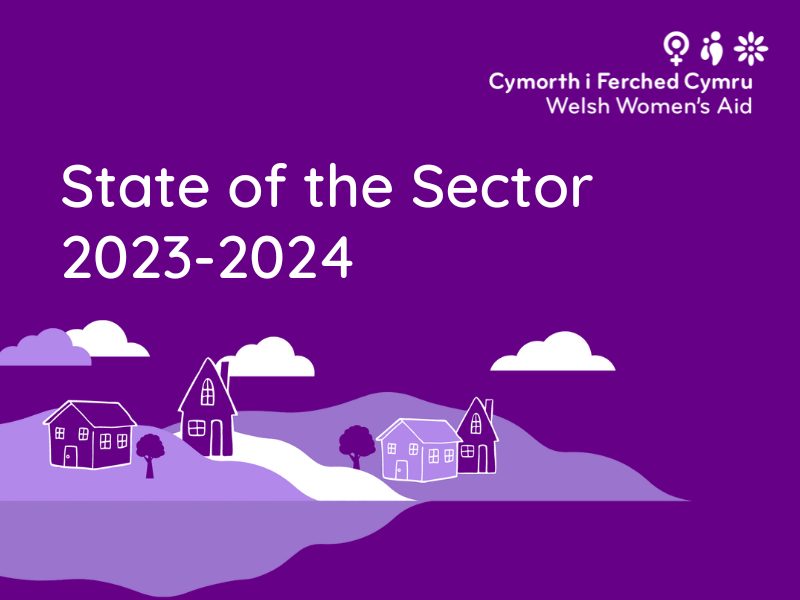
Critical investment needed to guarantee support for survivors of domestic abuse and sexual violence in Wales
Following a recent visit to the UK, the United Nations Special Rapporteur on Violence against women and girls declared violence against women a “national threat”.
Research published today by Welsh Women’s Aid demonstrates that while rates of violence against women and girls in Wales are increasing, funding for the specialist services that support them is severely lacking.
Last year, 712 survivors in Wales were unable to access critical refuge services, with most of these survivors unable to be supported due to lack of refuge space. The Live Fear Free Helpline, funded by Welsh Government, handled over 23,000 contacts across the same period, with a 33% increase in the number of emails and a 43% increase in the number of texts. Not only is demand on the Helpline increasing, Helpline Advocates also reported increased complexity of calls, which is a pattern that has continued since the COVID-19 lockdowns and shows no sign of stopping.
While data from Welsh Women’s Aid member services showed a 28% increase in reports of financial abuse last year, survivors also detailed increased levels of post-separation financial abuse. The cost-of-living crisis is also having a disproportionate effect on women, with survivors having to make extremely tough choices such as selling items “to make ends meet” and specialist services increasingly supporting survivors to access food banks and food vouchers alongside providing core services.
In the report, we evidence that difficulties in accessing support are compounded by the housing crisis and, particularly for migrant survivors, lack of training and knowledge of violence against women, domestic and abuse and sexual violence among staff in statutory services. We call on Welsh Government to do all within their power to increase access to housing and welfare benefits, improve training, and advocate for a full lifting of no recourse to public funds.
The report shows that the patchwork nature of the funding system across Wales is insufficient and is undermining services’ ability to provide life-saving, needs-led support for survivors in Wales. With estimations that local authorities in Wales will face a funding gap of £744 million by 2027, we are concerned that specialist domestic abuse and sexual violence services will need to pick up the pieces of their cuts. The transition of labour from statutory to non-statutory services as a result of austerity is leaving staff in specialist services overworked, underpaid, and burnt out.
Read the full report here: English / Welsh
Welsh Women’s Aid CEO, Sara Kirkpatrick, said
“We are once again reiterating the need for increased funding and for that funding to be ringfenced for violence against women and girls, domestic abuse and sexual violence (VAWDASV) services. Frontline services continue to face challenges from all directions, which in short indicates managing increased demand with decreased resource. The pressure on services shows no sign of relenting, indeed it appears to be worse year on year. They are now having to face these challenges in the midst of a cost-of-living crisis. To truly end violence against women, domestic abuse and sexual violence we need to find solutions in all areas.
Having a whole systems approach will ensure that our aims to end VAWDASV are not just limited to specialist organisations. We need an approach that looks towards all sectors to be part of the solution and to build on our national commitments to recognising that VAWDASV is everyone’s business and to achieve change that truly lasts.
Specialist organisations work incredibly hard to provide lifesaving support to survivors all across Wales. We are calling for a response that doesn’t just look at budgets but to the social cost and how all systems can work together to be more accessible and supportive to survivors.”
Stephanie Grimshaw, Head of Public Affairs and Communications said
“Welsh Women’s Aid have been calling for an increase to the Housing Support Grant in order to better support survivors onwards to safe and adequate housing and avoid the use of refuges as long-term accommodation. Whilst we greatly appreciate an increase in the Housing Support Grant, it has already been made clear by frontline organisations that this has not been enough.
Each and every organisation needs to consider how it’s policies and processes can better support survivors from every intersection of life. Only then can we see a lasting end to VAWDASV for all women and girls.”
Without a sustainable funding model that simplifies tendering processes and guarantees the future of the sector, services may not be viable and survivors may face longer waits for support, services and safety.
Today we are calling on Welsh Government to commit to the long-term, sustainable, inflation-linked funding needed to make Wales the safest country in the world to be a woman.
Anyone experiencing violence against women, domestic abuse or sexual violence, or abuse, or those concerned about somebody at risk – support is available to you now. Live Fear Free is a confidential and independent helpline that can provide advice and support 24 hours a day, 7 days a week. Call 0808 80 10 800 / text 07860077333 / email [email protected].”
ENDS. For more information, please contact Stephanie Grimshaw, Head of Public Affairs and Communications on [email protected]

